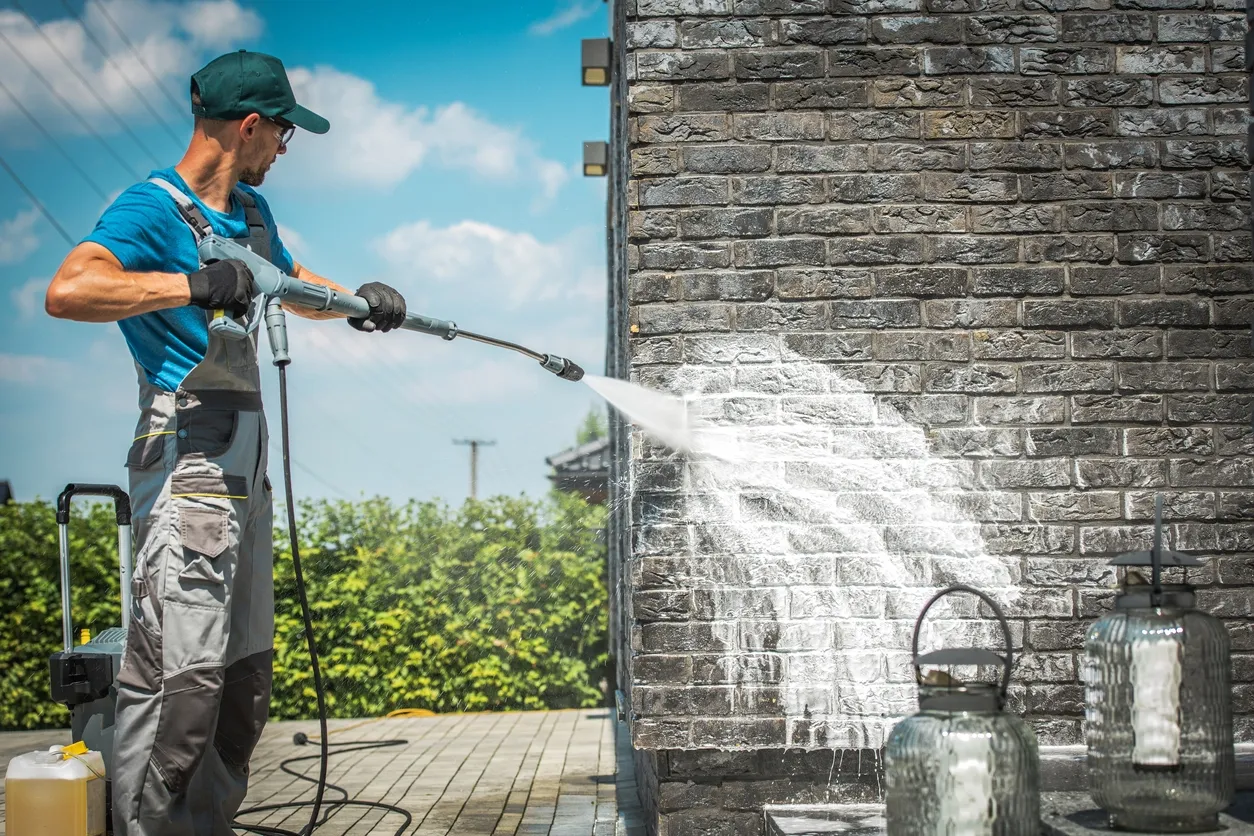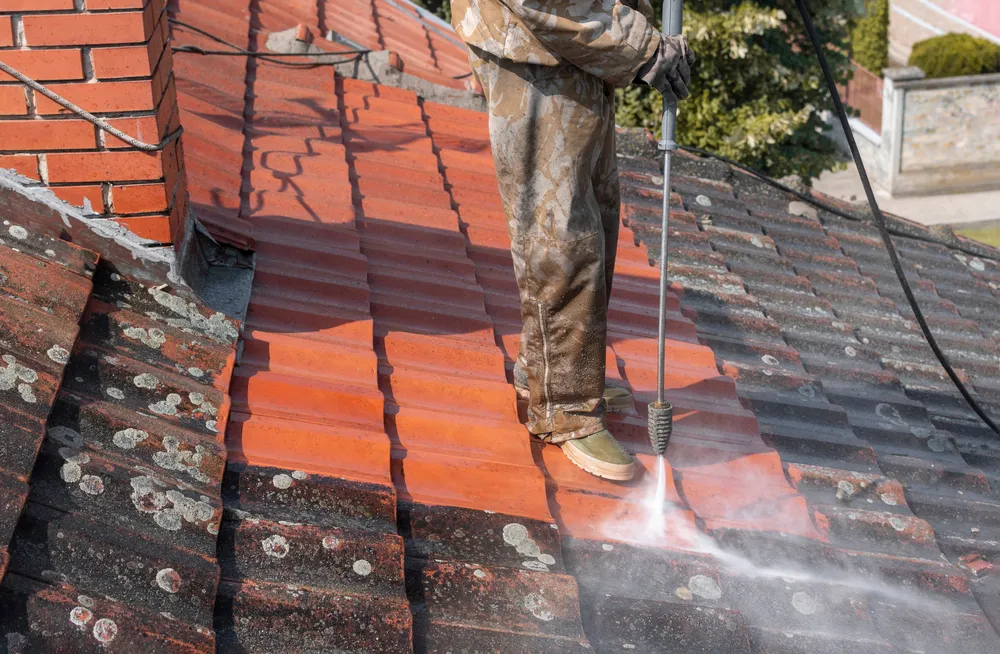CALL US TODAY · 909-701-9977
Can You Power Wash Brick House Exteriors? Dos and Don'ts
Can you power wash brick? Understanding the versatility and effectiveness of power washing encompasses various surfaces, among which brick holds a prominent position. Power washing, a high-pressure water-based cleaning method, offers an appealing solution for reviving and cleaning different surfaces; brick is no exception.
Can You Power Wash Brick Surfaces?

Addressing Safety Concerns of Power Washing Brick:
Water Pressure: Power washers generate high-pressure streams of water, which can cause injury if not handled properly. When using a power washer on brick surfaces, it's essential to adjust the pressure settings to a level that effectively cleans without damaging the bricks or causing harm.
Protective Gear: Ensure you wear appropriate safety gear, including goggles, gloves, and sturdy footwear, to protect yourself from debris and potential splashes.
Electrical Hazards: Be cautious of electrical outlets or wires near the power-washed area. Keep the power washer away from these elements to avoid electric shock.
Slippery Surfaces: The water used during power washing can make surfaces slippery. Take precautions to prevent accidents, such as placing warning signs and cordoning off the area until it's dry.
Suitable and Unsuitable Brick Surfaces for Power Washing:
Suitable Surfaces: Solidly constructed brick surfaces in good condition, such as exterior walls, walkways, or patios, are generally suitable for power washing. Ensure the mortar is in good shape and not crumbling.
Unsuitable Surfaces: Avoid power washing fragile or damaged brick surfaces, as the high-pressure water can exacerbate existing issues. Avoid using a power washer on historical or delicate bricks, as it can cause irreversible damage.
Potential Risks and Precautions:
Damage to Bricks: High-pressure water can chip or erode brick surfaces, especially if the bricks are old or fragile. Test a small, inconspicuous area first and adjust the pressure as needed to avoid damage.
Mortar Damage: Intense water pressure can dislodge or damage mortar between bricks. Check the condition of the mortar beforehand and avoid direct spraying at mortar joints to prevent weakening or dislodging.
Chemical Cleaners: Some cleaning solutions used in power washing may be too harsh for certain types of bricks. Check manufacturer guidelines and use mild detergents to avoid discoloration or damage.
Environmental Precautions: Consider the environmental impact of power washing. Use eco-friendly cleaning solutions and be mindful of where the runoff water goes, ensuring it doesn't harm plants or enter storm drains.
Is Power Washing Safe for Brick?
Impact of Power Washing on Brick Structures:
Abrasion Potential: Brick surfaces vary in hardness and composition. High-pressure water can potentially erode softer bricks or damage mortar if not used properly.
Water Pressure: Adjusting the pressure is crucial. Excessive pressure can force water into the brick's pores, leading to moisture retention and potential structural damage over time.
Cleaning Agents: Some detergents or chemicals used in power washing might affect the integrity of the bricks or the mortar. The wrong cleaners can cause discoloration or erosion.
Factors Influencing the Safety of Power Washing for Bricks:
Pressure Settings: Using the right pressure setting is key. Lower pressure settings combined with wider nozzles can minimize the risk of damage.
Distance and Angle: Maintain a safe distance from the surface and an optimal angle to prevent direct, forceful impact on the bricks.
Testing: Before full-scale cleaning, test a small, inconspicuous area to determine the impact of the power washing on the specific brick type.
Experience and Skill: Professional expertise matters. Trained individuals understand how to handle different brick compositions and adjust the power washing accordingly.
Steps for Power Washing a Brick Surface
Preparing the brick surface for power washing:
Clear the area: Remove any obstacles, debris, or furniture from the area you'll be cleaning. Cover nearby plants or delicate surfaces to protect them from the pressure washer.
Inspect the surface: Check for any cracks, loose mortar, or damage to the bricks. Repair any damages before starting the power washing process to prevent further deterioration.
Soak the surface: Before power washing, wet the surface with water. This helps to loosen dirt and makes the cleaning process more effective.
Necessary equipment and tools for power washing brick:
Pressure washer: Choose a gas or electric pressure washer with an appropriate psi (pounds per square inch) for bricks. Lower psi (around 1500-2000) is suitable to prevent damage to the bricks.
Nozzles: Use a 25- or 40-degree nozzle for brick surfaces to distribute the pressure evenly without causing damage.
Safety gear: Wear safety goggles, gloves, and sturdy footwear to protect yourself from debris and high-pressure water.
Cleaning solution: Use a brick-safe detergent or cleaning solution specifically designed for pressure washers.
Step-by-step guide for safely power washing a brick surface:
Set up the pressure washer: Connect it to a water source and plug it in (if electric). Test the spray pattern on a small, inconspicuous area to ensure it won't damage the bricks.
Apply the cleaning solution: Fill the detergent reservoir or use an appropriate attachment to apply the cleaning solution to the brick surface. Let it sit for a few minutes to break down dirt and grime.
Start power washing: Begin at the lowest pressure setting and hold the nozzle at a consistent distance (around 12-18 inches) from the surface. Use sweeping motions, overlapping each pass to ensure even cleaning. Work from top to bottom to prevent streaks.
Rinse thoroughly: Once you've cleaned the entire area, switch to a plain water nozzle and rinse the surface thoroughly to remove any remaining cleaning solution.
Tips to prevent damage and ensure effective cleaning:
Maintain a safe distance: Keep the nozzle at a safe distance from the surface to avoid chipping or damaging the bricks.
Work systematically: Divide the area into sections to ensure complete and even cleaning.
Avoid high pressure: Use low to medium pressure to clean brick surfaces. High pressure can cause damage by eroding the mortar or chipping the bricks.
Regular maintenance: Consider power washing your brick surfaces annually or as needed to maintain their appearance and prevent excessive buildup of dirt and grime.
Can You Power Wash Brick Houses?

Power Washing Entire Brick Houses:
Power washing can effectively remove dirt, grime, mold, mildew, and other stains from brick exteriors. However, it's crucial to consider the pressure level used. Too much pressure can damage the mortar between bricks or even the bricks themselves. Typically, a lower-pressure setting with appropriate detergents is preferred to avoid any potential harm.
Safety Considerations for Residential Brick Exterior Power Washing:
Protective Gear: Ensure you wear protective gear, including safety goggles, closed-toe shoes, and appropriate clothing to shield yourself from debris and splashing water.
Proper Equipment Handling: Understand how to use the power washer correctly to prevent injury or damage to the house.
Electrical Safety: Be cautious with electrical outlets and connections when using electric power washers near the house.
Avoiding Damage: Use the appropriate nozzle and pressure setting to prevent damage to the bricks or mortar.
Chemical Handling: If using detergents or cleaners, follow manufacturer instructions and be mindful of their impact on plants, pets, and the environment.
DIY vs. Professional Power Washing for Brick Houses:
DIY Power Washing:
Cost: It's cost-effective initially since you're not hiring a professional.
Control: You have control over the process, timing, and areas you want to focus on.
Risk: There's a risk of causing damage due to improper technique or using the wrong pressure level or chemicals.
Time and Effort: It can be time-consuming and physically demanding.
Professional Power Washing:
Expertise: Professionals have the training and experience to handle power washing effectively without causing damage. JMPressureWashers provides the best guidance and services related to power washing bricks.
Quality of Work: They can deliver a more thorough and higher-quality cleaning.
Safety: They are equipped with proper safety gear and have liability insurance.
Time-Saving: It saves you time and effort while ensuring a better outcome.
Advantages Of Power Washing Brick House
Enhanced Curb Appeal: It can restore the original beauty of the brick by removing dirt, grime, and stains, improving the overall appearance of the house.
Prevents Damage: Regular cleaning prevents the buildup of mold, mildew, and algae, which can cause damage to the bricks over time.
Increases Property Value: A clean exterior boosts the value of your property, making it more attractive to potential buyers or renters.
Long-Term Maintenance: Power washing can extend the lifespan of your brickwork by removing contaminants that can deteriorate the surface.
Healthier Living Environment: Removing mold, mildew, and algae not only improves aesthetics but also contributes to a healthier environment by reducing potential allergens and pollutants.
Preparation for Painting or Sealing: If you plan to paint or seal your brickwork, power washing provides a clean surface, ensuring better adhesion and a more effective finish.
Time-Efficient: Compared to manual cleaning methods, power washing is faster and more efficient, saving time and effort.
Conclusion
The high-pressure water stream can efficiently remove dirt, grime, moss, mildew, and other accumulated debris from brick surfaces, restoring their original appearance. However, it's crucial to be cautious with the pressure settings as excessive force can damage the bricks or mortar. Using the appropriate nozzle and maintaining a safe distance while power washing can ensure a thorough clean without causing harm to the brickwork. Feel free to
contact us for any type of query or the services related to
can you power wash brick.
FAQs
Is Power Washing Safe For All Types Of Bricks?
Generally, yes. However, some bricks, particularly older or more delicate ones, might be susceptible to damage from high-pressure washing. It's advisable to test a small, inconspicuous area first and adjust pressure accordingly.
What Pressure Should Be Used For Power Washing Bricks?
It's recommended to use a pressure setting between 1500 to 2000 psi (pounds per square inch) to effectively clean bricks without causing damage. Always start with a lower pressure and increase cautiously if needed.
Can Power Washing Remove All Stains From Bricks?
Power washing can effectively remove dirt, grime, and most surface stains from bricks. However, deep-set or stubborn stains might require additional treatments or professional assistance.
Does Power Washing Harm The Mortar Between Bricks?
Using too high a pressure or getting too close to the surface can potentially damage the mortar. Hence, it's essential to maintain a safe distance and angle while power washing to avoid harming the mortar.
Should Bricks Be Sealed After Power Washing?
Yes, sealing the bricks after power washing can help preserve their cleanliness and protect them from future staining or weathering. It's a good practice to apply a suitable brick sealant after cleaning.
Can I Power Wash Bricks Myself Or Should I Hire A Professional?
It's possible to power wash bricks yourself, but it requires caution and proper equipment handling. If uncertain, or if dealing with a delicate surface, it might be wise to hire a professional to ensure the job is done safely and effectively.
JM Pressure Washers Blog
Tagline here
Contact Us
Pressure Washing Services For:
Riverside County | San Bernardino County
Orange County | Los Angeles County
Rancho Cucamonga, California
Riverside, CA
Business Hours
- Mon - Fri
- -
- Saturday
- Closed
- Sunday
- -










